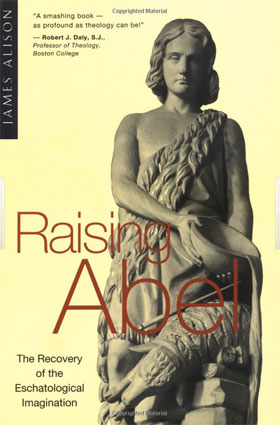I was excited on Thursday when my copy of James Alison’s Raising Abel arrived in the library loan pool. He’s one of the few Christian writers who has discovered Rene Girard’s work and is attempting to take it further. Budget cuts at the office have forced everyone to take some unpaid vacation, so I took the opportunity to drink coffee and read the entire book in one sitting today. This book is about eschatology. Sort of.

For starters, Alison is Roman Catholic. As far as eschatology is concerned, he might as well be on another planet. You would think a book about the end times might use phrases like “post-millenialism”, “pre-millenialism”, “dispensationalism” or maybe images from Revelation like “lake of fire”, “white throne of judgement”, etc. But no. Those are largely contemporary protestant ideas for predicting the future. Alison spends almost the entire time in the Gospels, looking really closely at what Jesus said. This is at once both more universally appealing and somewhat frustrating. It turns out the book has very little to say DIRECTLY about the eschatology. It just gives you a bunch of alternate perspectives and readings of Jesus’ parables and the apostles writings that let you come to your own conclusions about a whole host of things.
Parts the book were great, and I probably have seven or eight short posts coming up with a few excerpts. His short introduction to Girard’s mimetic theory is excellent and easy for anyone to understand (something I’ve been trying to do myself for a while). I was surprised to find a convincing argument that human beings are the source of all violence. He provides an adequate framework for seeing even the (seemingly) sometimes angry, vengeful God of the old testament as NOT demanding sacrifice. It turns out it is US that demand the sacrifice. This has implications in the realm of theodicy that work out to some killer good answers to some of the stickier questions about the problem of evil.
His readings of Jesus’ parables and discussions on the nature of hope I definitely found helpful. The parables are almost all ironic in some fashion. If you come up with an interpretation of them that takes everything straight up, it’s very likely you are missing an important point.
Probably the most developed chapter is titled “The Apocalyptic Imagination and the Delayed Parousia”. In it he deals head on with the fact that the apostles gradually and rather drastically evolve the language they use to describe Jesus’ return. At first it sounds like it’s just around the corner. Then it’s a bit more subdued. Then there are lots of assurances to the people that it’s OK that Jesus hasn’t come back yet – that patience is really important. Hmmm, maybe this is actually going to take a while and not look like what we thought. Without saying outright that the apostles were “wrong” about Christ’s return, he traces how it seems that their own understanding and description of eschatology developed from 33-90 AD. A bit controversial to be sure, but I’m really glad someone is asking these hard questions.
The book is a major contribution in applying Girard’s theory to several different big aspects of Bible study. It holds up pretty well too.
I do have to say though, I was a bit disappointed with some of the later chapters. They were just too darn abstract. It really just confirms my suspicions that the “things hidden since the foundation of the world” is a very deep well that has only begun to be drawn from. There is some obvious work right here – taking some of Alison’s more abstract ideas about eschatology, grace, and time and coming up with some concrete applications and simplified explanations.
On a side note, I stand in awe of folks that can read and write fluently in many languages! However, this book was translated from Spanish and sometimes it really shows. Watch out for the really odd sentence here and there.
